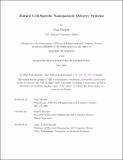Toward Cell-Specific Nanoparticle Delivery Systems
Author(s)
Murphy, Sean
DownloadThesis PDF (2.292Mb)
Advisor
Barzilay, Regina
Terms of use
Metadata
Show full item recordAbstract
The targetable delivery of therapeutic nanoparticles remains a significant challenge in modern medicine, particularly due to the complexity, time, and expense involved in experimental design and optimization for cell-specific applications. To address this, NOCAP (Nanoparticle Optimization and Cell Affinity Prediction) was developed, a computational framework designed to (i) predict the affinities between nanoparticles and gene expression signatures of cancer cells and (ii) optimize nanoparticle formulations for specific targets. NOCAP successfully predicts cellular affinity for previously unseen cancer cell lines. The findings demonstrate the potential of machine learning to streamline the rational selection of target-specific nanoparticle drug delivery systems, paving the way for more efficient and precise therapeutic interventions.
Date issued
2024-05Department
Massachusetts Institute of Technology. Department of Electrical Engineering and Computer SciencePublisher
Massachusetts Institute of Technology